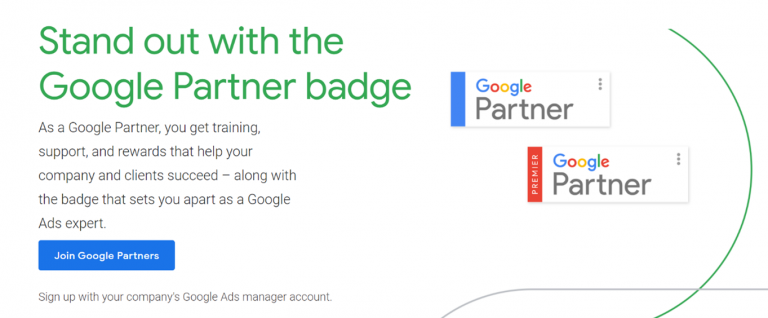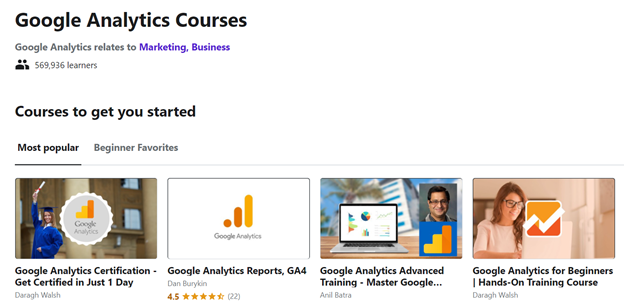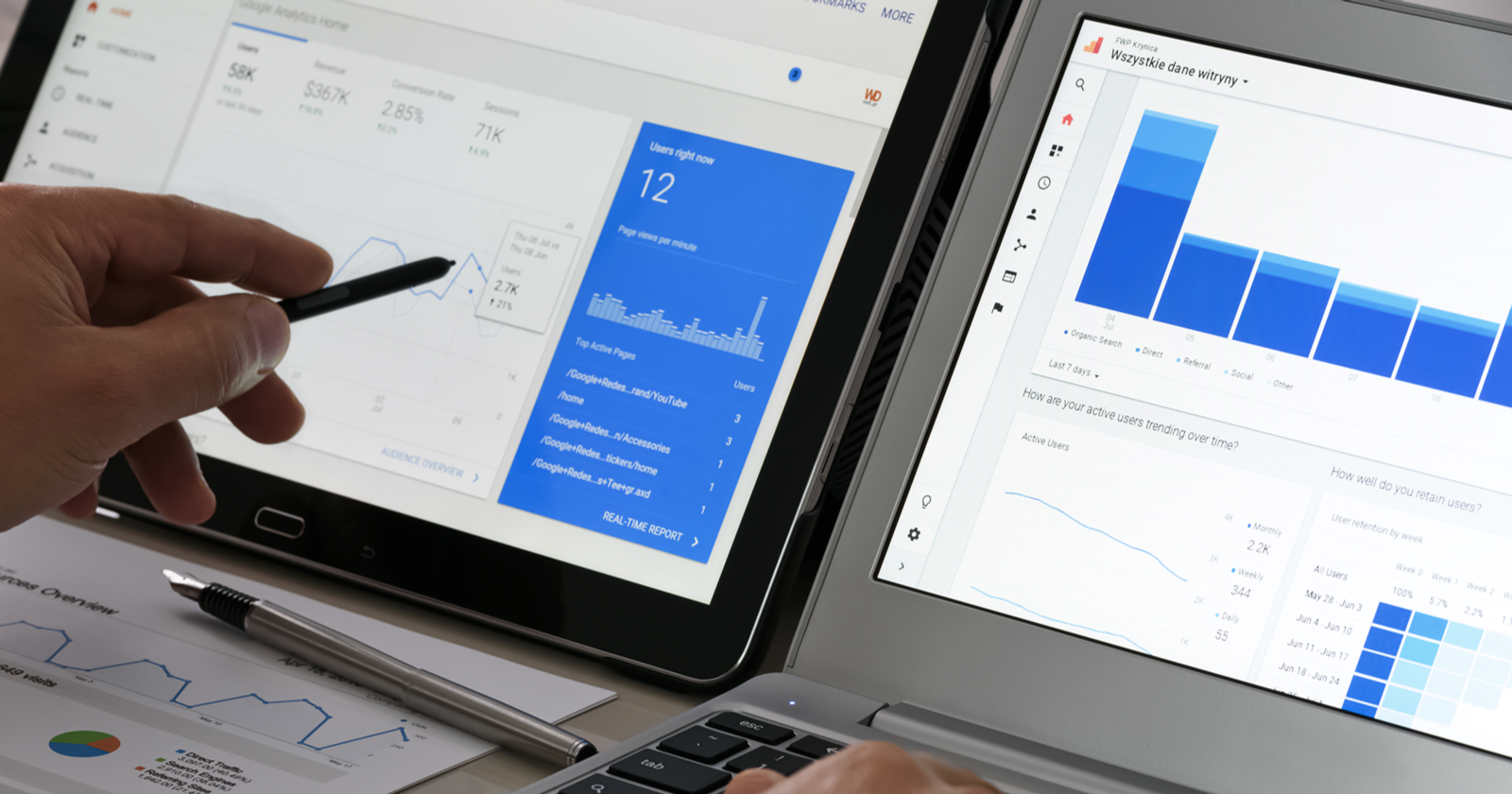Google Analytics is the most well-known and widely-used analytics software in the industry.
However, it can still take time to get familiar with the platform.
With so many data visualizations and reporting options, it can take you a lot of time to find the best way to use Google Analytics to its full potential.
There are a few ways to solve this:
- Hire individuals that are already Google Analytics certified.
- Attempt to figure out analytics on your own without certification.
- Get someone on your team certified.
For most, option 3 is the quickest and most cost-effective option to make the most of analytics in the long run.
Google Analytics certification gives you an invaluable tool to improve your marketing, better serve your target audience, and increase your customer base.
What follows is a walk-through of the certification process and some of the biggest benefits of being certified.
The Certification Process
Step 1: Sign up for Google Partners

The first step you need to take is to sign up for Google Partners, because you have to be a Partner in order to take the GAIQ.
This in itself can be a career booster, because Google Partners comes with a badge that shows you’re certified in different areas of Google (providing you pass the content exams). Others will see your badge and recognize you as an expert.
In June 2021, Google Partners will be offering a new “Google Partners Badge” that will be offered to users and companies that meet the new requirements.
To receive the new badge, accounts will need to meet new thresholds in the three different categories:
- Performance.
- Spend.
- Certification.
Within the performance category, the Ads manager must have a minimum optimization score of 70%. An account must spend $10,000 over the course of 90 days. And at least 50% of account strategists must be Google Analytics certified.
If the business achieves the new standards, the account will achieve the new badge that proves their skill and expertise within the Google Analytics program.
Being certified in Google Analytics will make you more marketable to companies looking to receive the Google Partners Badge.
This is great to put on your resume or LinkedIn profile, and to have associated with your business.
In short, definitely take this first step.
Step 2: Take the GAIQ Exam
Technically the next step after signing up for Partners is to take the exam, but unless you’re already an expert in Google Analytics, we recommend doing some studying in between steps 1 and 2.
At least take the time to learn about the exam – how it’s broken up, time limits, question formats, etc. (which we’ll explain below).
Search Engine Journal’s Google Analytics guide is a great starting-off point for anyone looking to learn more about Google Analytics.
Thankfully, Google offers IQ courses in order to teach people about their programs and to help prepare them for these certification exams.
These courses are targeted at everyone from beginners to the most experienced users, so there’s something for everyone.
We recommend reviewing material from the following courses (but you should tailor the study material to your skillset – no need to start at the beginning if you’re already an advanced user):
- Google Analytics for Beginners.
- Advanced Google Analytics.
- Google Analytics for Power Users.
- Getting Started with Google Analytics 360.
You can access the courses here.
Udemy is also a great resource for anything analytics, offering multiple Google analytics courses for new and experienced users.

While Google has a lot of resources for getting certified, they aren’t great for those who really want to learn the practical, real-world applications.
There are different data bootcamps online that cover all the knowledge and best practice tips and tricks you need to master for Google Analytics.
In addition, there’s a Google Analytics YouTube Channel that has great reviews for anyone wanting to learn more about the program.
Once you’ve exhausted the content, you should take the time to learn about the test itself.
The GAIQ is broken up into modules, so you take the exam one subject at a time.
The website states that you have 60 minutes to take the exam, but you actually have 90 minutes from start to finish.
There are 70 questions total and they consist of multiple choice and True/False. As soon as you begin the exam the timer begins counting down, and you are unable to press pause for any reason, and a passing score is 80 percent or higher.
If you fail, you’re required to wait 7 days before taking the exam again.
Finally, we recommend taking several practice tests prior to beginning the real exam. You can find free practice tests here. This site isn’t officially associated with Google, but it gets great reviews.
Keep in mind that these practice tests have been said to be more difficult than the real GAIQ, so if you pass a few of these chances are you’re ready for the real deal.
Once you pass the GAIQ you’ll receive a certificate, which will be reflected in your Google Partners account (that badge we were talking about earlier) and everyone will know you’re an analytic genius.
But Is Google Analytics Certification Worth It?
Getting certified is clearly no walk in the park, so is it really worth it to go to all this trouble?
In short, yes.
But not just for the certificate, or the badge, or the extra bullet point on your CV.
Chances are you’ll pick up a lot of useful analytic knowledge in preparation for the test; much more than you would if you just use the program in passing here and there.
You’ll learn in-depth information about specific Google Analytics features that you can then pass on to your employers and colleagues. You’ll be considered a qualified web analyst, which should open job opportunities or ensure job security as this is an in-demand position right now.
The Takeaway
Analytics is the foundation of SEO, social media marketing, search engine marketing, and more.
If all this isn’t enough to convince you, just remember that you’ll have the opportunity to share your passion (and your knowledge) of analytics with anyone else who wants to learn.
Be proud of your newfound skills, and use them to improve the lives of others.
More Resources:
- A Complete Guide to Google Analytics
- How to Set up Google Analytics Goals & 7 Tips to Get Ahead
- 5 Useful SEO Insights You Can Learn from Google Analytics
Image Credits
All images taken by author, May 2021





